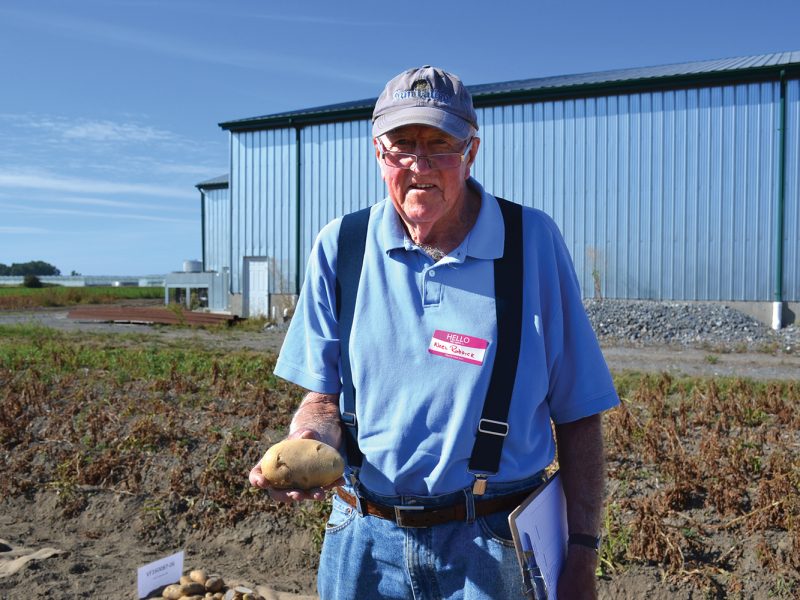DELTA – A veteran of the seed potato sector has stepped down after 44 years with the BC Certified Seed Potato Growers Association.
Noel Roddick declined to stand for re-election at the association’s annual general meeting at the end of November. Roddick had served as the association’s secretary-treasurer since 1978, when Richmond grower George Wright called him from that year’s AGM.
“I said, ‘I probably should think about it,’ and he said, ‘You should also think about the fact there’s a whole lot of customers in your room here, and if you don’t want to do it I’m sure none of them is ever going to buy another ton of fertilizer from you ever again,’” Roddick recalls.
Roddick, now 84, had started his farm supply business in 1970, and was fast becoming a familiar and trusted member of the local farm community. He accepted Wright’s invitation.
“We had a fertilizer office and we had all the equipment so it was a natural thing to do and didn’t take a lot of time,” he says.
The role of secretary- treasurer was important. With the help of federal potato researcher Norman (Bud) Wright, a virus-free breeding program had been established in Pemberton in the 1960s. It handled more than 100 varieties at its peak.
“He picked Pemberton because it was an isolated valley,” says Roddick. “They did this tissue culture and they got generations of virus-free seed potatoes in every variety. … This meant there was really, really clean seed.”
Pemberton growers grew the seed, then sent stock to Richmond and Ladner to be multiplied.
“This is where I came in, keeping the accounts and doing the books for them,” says Roddick.
The program set the pace for growers across North America, he says. The province always had a strong reputation for potato production, with Asahel Smith of Ladner winning a trophy for the best potatoes in North America at the Grand Pan-American Exhibition in New York in 1911. The virus-free program furthered that reputation.
“People would come from Idaho and California and they’d see these spuds, and there wasn’t a blemish on the whole field. They couldn’t believe it, how good they looked, and they went and did their own programs along the same lines,” says Roddick.
However, the province has become a victim of its own success. BC seed potato acreage has steadily declined from 1,036 acres in 2013 to 556 last year. Meanwhile, acreage in all other Western provinces has increased, led by Alberta.
“Alberta’s now a huge seed potato grower, and they followed Bud Wright’s program,” says Roddick. “I think it was inevitable that others would see what a good program it was, and what clean and vigorous seed it produced.”
The result is that BC seed producers are exiting the industry. Lower Mainland growers like Bill Zylmans are retiring, while the Pemberton Valley is down to just six growers following the decision of Ronayne Farms to exit the business after five generations.
Meanwhile, commercial acreage has increased thanks in part to the efforts of BC Fresh to grow local sales against a tide of imports from neighbouring jurisdictions as well as investment in new processing facilities.
And herein lies an irony: while the opportunities for seed producers should be increasing in step with commercial production, they’ve declined. Despite a push for locally adapted varieties in crops from vegetables to blueberries, the big commercial growers are sourcing their seed from elsewhere.
“The potato business has been able to expand its share of the local market,” he says. “We just hope that when it comes to buying seed potatoes, the people who grow the commercial stuff will buy local, too.”
Anna Helmer, whose family has been farming in the Pemberton Valley for three generations and supplies organic seed to growers across BC, shares Roddick’s concern. While her business continues to see good demand, she knows that without good seed, neither organic nor conventional growers will be producing a solid crop. And that knowledge gives her hope.
“Potatoes require good seed to produce commercially or eventually, the crop will fail. Commercial growers need us,” she says. “I am cautiously excited for the future of the seed business. I think the conventional ones will get bigger and the organic ones will just continue to slowly grow the business.”
But the industry also needs leadership, and with Zylmans and Roddick retiring, there’s a need for younger growers to step up. Nicki Gilmore of Pemberton has stepped into Roddick’s role, but Zylmans – who received the BC Agriculture Council’s Award for Excellence in Agriculture Leadership last year – has been almost irreplaceable.
“It’s quite a commitment. I don’t know whether the younger brigade are going to be able to do that.”


 Young butchers make their mark
Young butchers make their mark